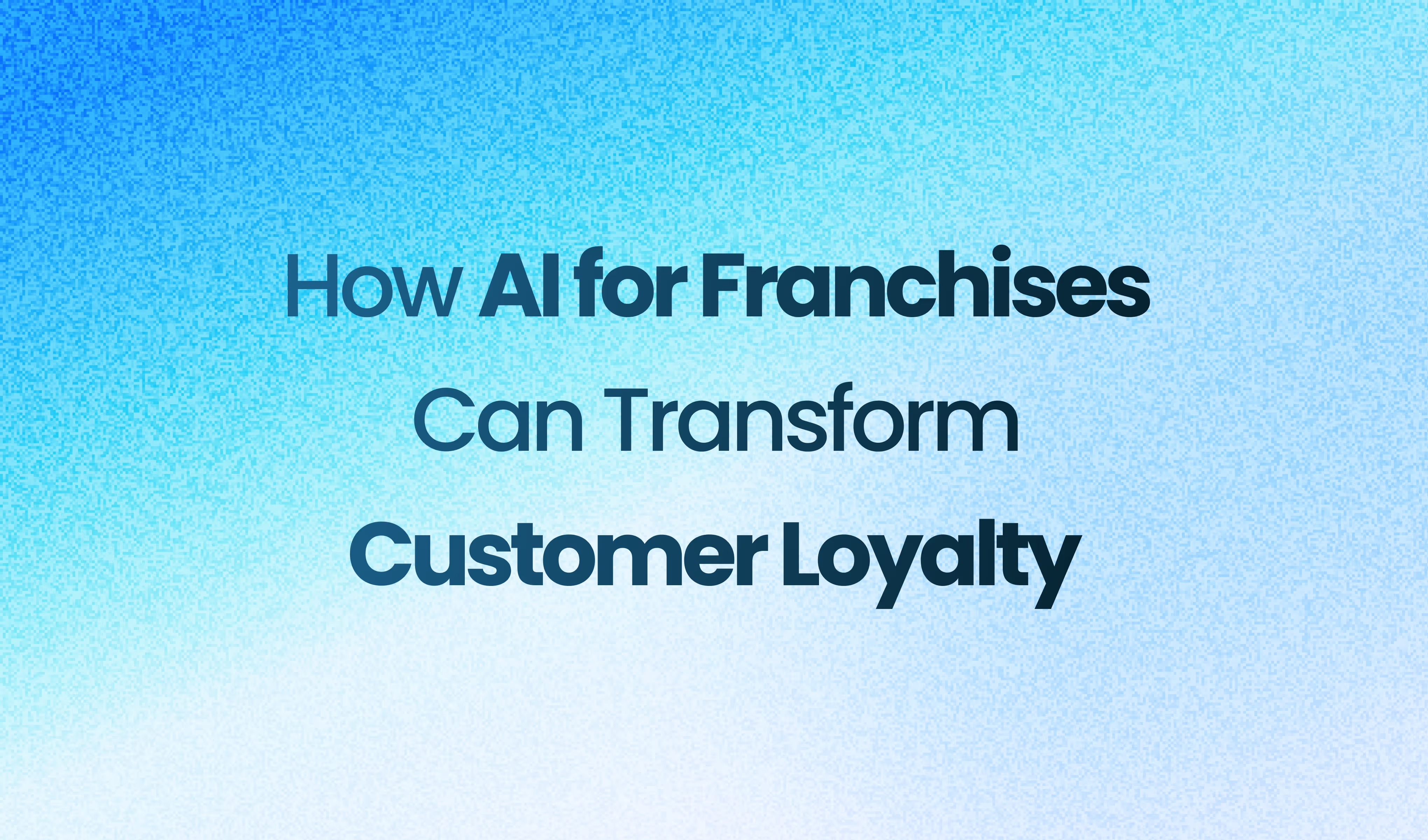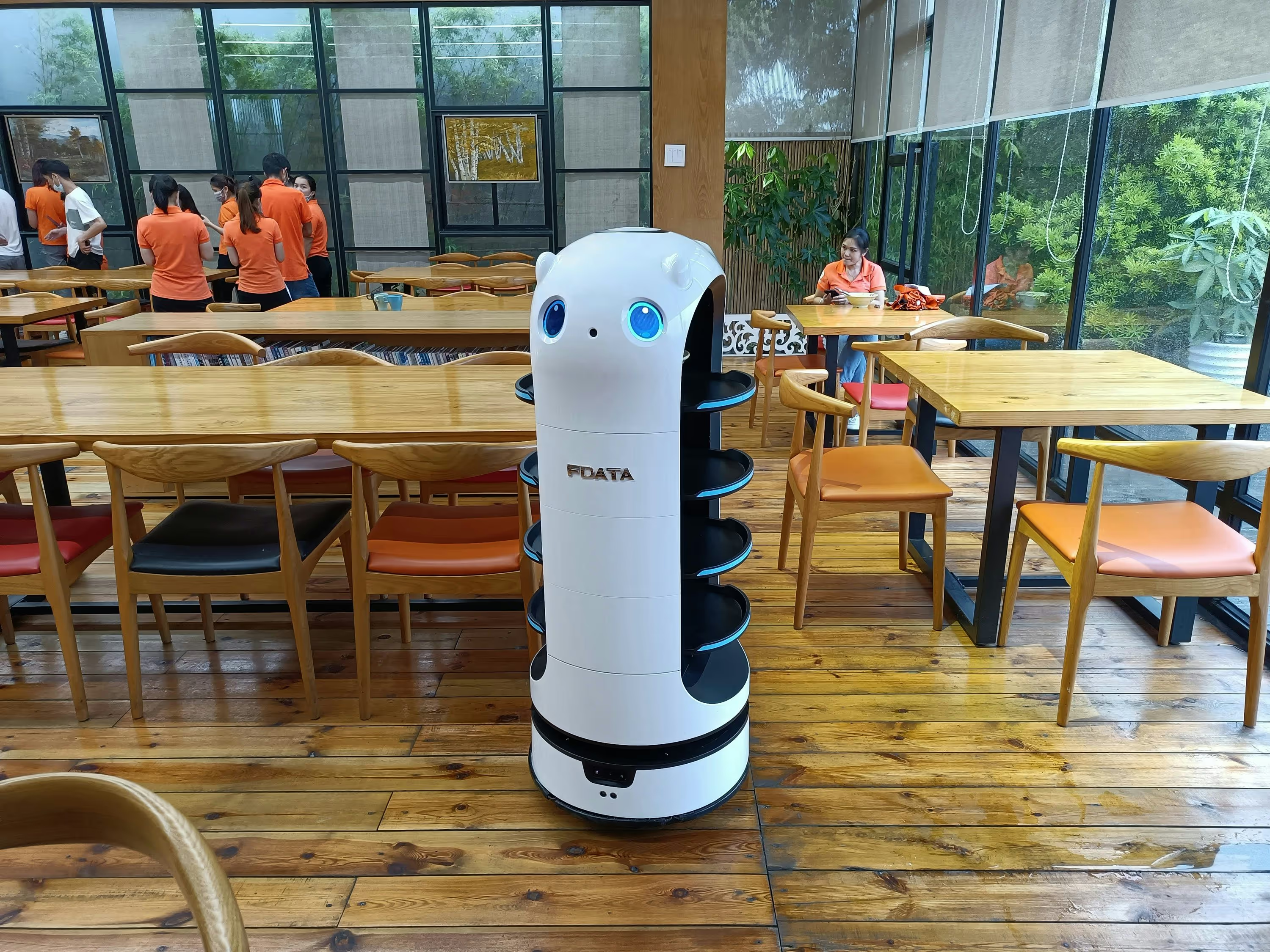
MIN READ -
September 10, 2025
AI Integrations Specialist
What if your favorite coffee shop already knew your order? Not just remembered it, but truly knew you. This is the new frontier for franchise businesses, powered by artificial intelligence. Today's technology is moving beyond generic greetings and transactional service to foster genuine relationships. By leveraging AI, franchises can deliver a level of personalized customer service that makes every person feel seen and valued. This shift isn't just about better technology; it's about building unbreakable customer loyalty through smarter, more empathetic interactions.
The definition of customer loyalty is changing. It's no longer enough to offer a simple punch card or a generic discount. Modern consumers demand experiences that recognize their individuality and preferences. For franchises, this presents a unique challenge: how do you deliver consistent, personal service across dozens or even thousands of locations?
This is where AI becomes a game-changer. It provides the tools to maintain brand integrity while empowering each franchisee to enhance customer engagement. By harnessing data, AI helps build a foundation for lasting franchise growth, one personalized interaction at a time. The following sections will explore how this technology is making that vision a reality.
In today's competitive market, personalization is not a luxury; it's an expectation. A study by McKinsey reveals that 71% of consumers expect companies to deliver personalized interactions. When businesses fail to provide this, customers get frustrated and may take their business elsewhere. For a franchise, this means every location must deliver a tailored customer experience to remain relevant.
How can franchisors leverage their vast amounts of customer data to achieve this? AI systems can analyze purchase histories, feedback, and engagement patterns from across the entire franchise network. This process turns raw data into actionable insights, helping you understand not just what customers buy, but why.
This deep understanding allows you to create offers, recommendations, and services that resonate on an individual level. When you know a customer is vegetarian or trying to cut back on sugar, you can provide suggestions that show you're paying attention. That's the power of AI-driven personalization.
The difference between a forgettable transaction and a memorable experience often comes down to one thing: feeling understood. For years, most customer interactions have been generic, following a standard script. AI is changing this by empowering franchises to create consistently positive and personal moments that boost customer satisfaction.
When AI remembers a customer's past preferences or dietary needs, it transforms a simple order into an act of hospitality. This isn't about replacing human connection but augmenting it. It gives your team members the information they need to provide better, more thoughtful service. This fundamentally alters the communication between a brand and its customers, making it feel more like a two-way conversation.
This shift impacts marketing strategies as well. Instead of broad, one-size-fits-all promotions, you can target customers with offers that reflect their unique behavior and history with your brand. This approach feels less like an advertisement and more like helpful advice from a friend, building trust and encouraging repeat business.

The ability of AI to understand and predict customer preferences isn't magic; it's the result of sophisticated data analysis and machine learning. By processing vast amounts of information from every customer touchpoint, AI algorithms identify patterns that would be impossible for a human to see. This turns scattered data points into a clear picture of individual and collective desires.
The use of AI allows franchises to move from being reactive to proactive. Instead of waiting for a customer to complain or make a request, you can anticipate their needs and offer solutions before they even ask. This capability provides actionable insights that can shape everything from menu development to marketing campaigns, as detailed below.
To build loyalty, you first need to understand your customers. AI excels at collecting and analyzing customer data from multiple sources across your franchise network in real-time. This creates a dynamic, 360-degree view of each customer, enabling you to respond instantly to their needs and behaviors.
Franchises can use their existing data to improve loyalty with AI by unifying information from various systems. This includes:
By centralizing this information, AI-powered data analytics can identify trends and opportunities as they happen. This allows you to make immediate adjustments to service, marketing, and operations, ensuring that every decision is informed by the most current customer intelligence available.
Understanding past customer behavior is valuable, but predicting future needs is revolutionary. This is where predictive analytics comes in, using AI to forecast what a customer might want next. By analyzing historical data, AI can identify signals that precede certain actions, allowing your franchise to make proactive, personalized offers.
Imagine a customer who frequently orders a salad but avoids walnuts. Predictive analytics can ensure that future recommendations for new salads automatically exclude that ingredient. Or, if a customer mentioned a fitness goal three visits ago, the system can suggest a new high-protein menu item. This transforms the interaction from a simple sale into a caring and attentive experience, which is the cornerstone of true customer loyalty.
These actionable insights directly improve day-to-day operations. Team members are equipped with smart recommendations, inventory can be optimized based on predicted demand, and marketing efforts can be targeted with surgical precision. This proactive approach not only delights customers but also makes your franchise more efficient and profitable.
Beyond enhancing the customer experience, artificial intelligence is a powerful tool for optimizing internal franchise operations. Many routine tasks that consume valuable time and resources can be automated, freeing up your team to focus on higher-value activities like strategic planning and customer engagement.
This operational efficiency leads to significant cost savings and a reduction in human error. From streamlining how orders are placed to ensuring optimal staffing levels, AI helps every franchise location run more smoothly and profitably. The following examples illustrate how this technology is making a tangible impact on the bottom line.
The ordering process is one of the most critical touchpoints in any service franchise. AI technology is making this step faster, more accurate, and more convenient for both customers and staff. By automating key parts of the ordering and payment processes, you can improve service quality and throughput, especially during peak hours.
Several AI-driven tools are available to help franchises with these operations. These solutions are designed to handle high volumes and maintain consistency across all locations. Key examples include:
Integrating these tools not only boosts efficiency but also captures valuable data with every transaction. This information can then be used to further refine your operations and marketing strategies, creating a cycle of continuous improvement.

Effective staff scheduling is crucial for maintaining service quality and controlling labor costs, but it's often a complex and time-consuming task. One of the key benefits of AI is its ability to analyze historical data to create highly optimized schedules that align staffing levels with predicted customer traffic.
AI systems can process sales patterns, seasonal trends, local events, and even weather forecasts to determine the ideal number of team members needed for any given shift. This data-driven approach prevents both understaffing, which hurts service quality, and overstaffing, which drains profits. The system can also manage employee availability and preferences, making the scheduling process fair and efficient.
Furthermore, when unexpected changes occur, such as a team member calling in sick, AI can quickly identify and contact available staff to fill the shift. This automation reduces the burden on managers, minimizes service disruptions, and ensures that your franchise is always prepared to meet customer demand.
Artificial intelligence is reshaping franchise marketing strategies by enabling a level of personalization and efficiency that was previously unattainable. Instead of casting a wide, generic net, franchises can now use AI to deliver the right message to the right person at the right time, dramatically improving customer engagement.
This technology empowers your entire franchise network to execute sophisticated, data-driven marketing efforts with ease. From hyper-personalized campaigns to automated social media management, AI provides the tools to build stronger customer relationships and drive measurable results across all locations.
The primary advantage of using AI for franchise marketing is the ability to create hyper-personalized campaigns that resonate deeply with individual customers. Generic promotions are easily ignored, but an offer tailored to someone's specific tastes and habits grabs their attention and makes them feel understood. This is a key driver of customer engagement and loyalty.
Using predictive analytics, AI technology can identify which customers are most likely to respond to a particular offer. For example, it can target a new vegan product to customers who have previously purchased plant-based items or send a special birthday discount just before a customer's special day. These targeted marketing campaigns are far more effective than traditional mass marketing.
This level of personalization not only increases conversion rates but also strengthens the customer's bond with your brand. When marketing feels less like an interruption and more like a helpful suggestion, it builds trust and encourages customers to choose your franchise over competitors.
Managing a franchise's online reputation across numerous locations can be a monumental task. AI-driven automation tools are available to help franchises streamline their social media and review management, ensuring a consistent and timely response to customer feedback. This is crucial for maintaining a positive brand image.
These tools can handle a variety of tasks, saving your marketing efforts significant time and resources. They help you stay on top of the conversation and engage with your community effectively. Key functions include:
By automating these processes, franchisees can focus on more strategic initiatives while ensuring their online presence remains strong and consistent across the board.
Excellent customer support is about resolving issues quickly and effectively. AI technology allows franchises to provide proactive and immediate customer service, often answering questions or solving problems before they escalate. This leads to higher customer satisfaction and reduces the workload on your support teams.
By using AI-powered tools, you can offer 24/7 assistance and gain deeper insights from customer feedback. This ensures that every customer feels heard and supported, strengthening their loyalty to your brand. The following sections explore how AI is transforming the customer support landscape for franchises.
AI is changing communication by providing tools like chatbots and virtual assistants that offer instant, 24/7 customer service. These automated systems can handle a large volume of common inquiries simultaneously, such as questions about store hours, menu items, or order status, without any wait time for the customer.
This immediate availability is a significant advantage for franchise operations. Customers get the answers they need right away, day or night, which greatly improves their experience. For the franchise, it frees up human team members to focus on more complex or sensitive issues that require a personal touch. This creates a more efficient and effective customer service model.
By providing a reliable first point of contact, chatbots streamline the communication process between the brand and its customers. They ensure that every inquiry receives a prompt and accurate response, setting a standard of excellent service across the entire franchise network.

Understanding the emotion behind customer feedback is critical for improving service quality. Sentiment analysis, an AI-powered technology, automatically analyzes text from reviews, surveys, and social media to determine whether the tone is positive, negative, or neutral. This provides franchises with immediate, actionable insights into public perception.
This capability is a powerful tool for improving day-to-day operations. For instance, if sentiment analysis detects a spike in negative comments related to wait times at a specific location, management can be alerted in real-time to address the issue. This allows you to proactively solve problems before they damage your brand's reputation.
By systematically tracking and analyzing customer feedback, sentiment analysis helps you identify recurring themes and operational weaknesses across your network. This constant flow of intelligence enables you to make data-driven improvements to training, processes, and products, leading to a better overall customer experience.
Successfully integrating artificial intelligence requires more than just purchasing new software. A successful AI adoption strategy involves careful planning, clear communication, and a commitment to franchisee training. Preparing your systems and your people is essential for a smooth transition and for maximizing the benefits of the technology.
To ensure your franchise is ready for this transformation, you must assess your current infrastructure and develop a robust change management plan. This preparation is a critical step in long-term franchise development and ensures that every franchisee has the support they need to thrive.
The first step franchise owners should take to prepare for AI adoption is a thorough assessment of their existing data infrastructure and franchise systems. AI relies on high-quality, accessible data to function effectively. Without a solid foundation, even the most advanced AI tools will fail to deliver valuable insights.
This audit should evaluate your current technology stack, data collection processes, and the compatibility of different systems. The goal is to identify gaps and create a roadmap for the integration of AI. Key areas to review include your POS, CRM, inventory, and marketing platforms, ensuring they can communicate with each other.
A readiness assessment helps you understand what changes are needed before you invest in new technology. This proactive approach to data analytics and system integration prevents costly mistakes and sets your franchise up for success.
Once your infrastructure is ready, the next critical step is preparing your people. Effective change management and comprehensive training programs are essential for getting franchisees and their teams on board with AI. Resistance to new technology is common, so it's vital to communicate the benefits clearly and address any concerns head-on.
Your training should be tailored to different roles and individual learning styles. Instead of a one-size-fits-all approach, consider a mix of formats to ensure the information sticks. This is especially important when onboarding new franchises, as it sets the standard for technology use from day one. A successful training strategy should include:
By investing in your people, you foster a culture of innovation and cooperation. This ensures that the AI tools are not just implemented but embraced, maximizing their impact across the entire network.
While the benefits of AI technology are compelling, franchise businesses must also be aware of the potential challenges and risks. A thoughtful and cautious approach is necessary to avoid common pitfalls, such as high initial investment costs, complex system integrations, and the ethical considerations surrounding data use.
Navigating these obstacles is key to a successful implementation. By understanding the risks, from data privacy concerns to the impact on employment, franchisors can develop strategies to mitigate them and ensure that AI is deployed responsibly and effectively.

One of the most significant legal considerations for franchisors implementing AI is data privacy. AI systems collect and process vast amounts of sensitive customer information, making legal compliance a top priority. Franchises must adhere to a complex web of privacy laws, such as the GDPR in Europe and the TCPA in the United States, to avoid steep fines and reputational damage.
It is crucial to establish clear policies for how customer data is collected, stored, used, and protected. This includes implementing robust cybersecurity measures to prevent unauthorized access and data breaches. Transparency with customers is also essential; they should be informed about what data you are collecting and how it is being used to enhance their experience.
Franchisors should consult with legal experts to ensure their AI adoption strategy is fully compliant with all relevant regulations. Proactively addressing these legal requirements from the outset will protect your business, your franchisees, and your customers.
A potential downside of AI in franchising is the risk of over-automation, which can lead to impersonal and robotic customer interactions. While automation boosts efficiency, it should never completely replace the genuine human connection that builds lasting loyalty. Customers still value empathy, nuanced conversation, and the personal touch that only a human can provide.
The key is to use AI as a tool to support your team, not supplant it. AI should handle routine, data-heavy tasks, freeing up your employees to focus on what they do best: building relationships with customers. For example, an AI can process an order, but a team member should be there to offer a warm greeting and handle any complex questions.
Achieving this balance is critical for maintaining service quality. The goal is to blend the speed and accuracy of AI with the warmth and flexibility of human interaction. Franchises that master this hybrid approach will deliver a superior experience that is both efficient and authentically personal.
Looking ahead, several key technology trends are set to further revolutionize franchise businesses. The future of franchising will be defined by smarter, more integrated, and increasingly autonomous systems. Staying ahead of these market trends is essential for any franchise that wants to maintain a competitive edge.
The evolution will move beyond standalone AI tools toward fully unified ecosystems that manage every aspect of the business. This shift promises even greater efficiency, deeper customer insights, and more sustainable growth, shaping a new era for the industry.
One of the top technology trends for 2025 is the move toward unified AI ecosystems. Currently, many franchises use separate AI tools for different tasks—one for marketing, another for scheduling, and a third for customer service. The future lies in the integration of AI into a single, seamless platform where all these components communicate and share data.
In a unified ecosystem, insights from one area automatically inform actions in another. For example, an uptick in customer complaints about a specific product, detected by a support chatbot, could automatically trigger an adjustment in inventory orders and alert the marketing team to pause promotions for that item across the entire franchise network.
This holistic approach eliminates data silos and provides a complete, real-time view of the business. It turns a collection of tools into a true business intelligence engine, delivering more powerful and actionable insights to drive strategic decisions at every level.
Another major trend shaping franchise businesses is the advancement of predictive analytics toward fully autonomous operations. Today, AI largely provides recommendations and insights for humans to act on. In the near future, AI systems will be empowered to take action themselves, further streamlining operations and reducing the need for manual intervention.
Imagine an inventory management system that not only predicts future demand but also automatically places orders with suppliers to prevent stockouts. Consider a supply chain that self-optimizes delivery routes in real-time based on traffic and weather data. This is the promise of autonomous operations.
These systems will learn and adapt continuously, making your franchise more resilient and efficient. From dynamic pricing adjustments based on real-time demand to automated equipment maintenance schedules, autonomous operations will allow franchises to run with unparalleled precision and foresight.
The impact of AI technology on customer loyalty is not just theoretical; it's already happening in the real world. Leading franchise brands across various sectors are implementing AI to enhance their operations, create better customer experiences, and successfully expand into new markets.
These early adopters are demonstrating the tangible benefits of AI, from elevating the guest experience in restaurants to driving innovation in service-based industries. Their success provides a clear blueprint for how other franchises can leverage AI to build stronger, more profitable businesses.
Franchise service brands, particularly in the restaurant and retail sectors, are using AI technology to stay ahead of trends by focusing on a superior guest experience. They are implementing a range of tools designed to make every interaction faster, more personal, and more convenient, which is a key driver of customer engagement.
McDonald's, for example, is undergoing a massive "AI makeover" to enhance operations and deliver personalized promotions through its app. This is part of a broader trend where brands are using AI to innovate service delivery. Key examples of this in action include:
By integrating these technologies, franchises are improving service quality and creating a more seamless and satisfying experience that keeps customers coming back.
The use of AI is not limited to food and retail. Service-based franchise businesses are also leading industry innovation by applying AI to their core operations. These early adopters are gaining a significant competitive advantage by using technology to improve training, maintenance, and overall efficiency.
For example, Hilton Hotels uses an AI-driven platform to deliver personalized training to its thousands of employees. The system adapts to individual learning styles and progress, ensuring that every team member is trained to the same high standard of service quality. This leads to a more consistent and exceptional guest experience across all their locations.
In another example, GE Aviation uses predictive AI to monitor its aircraft engines, enabling airlines to schedule maintenance proactively before a failure occurs. This approach minimizes downtime and reduces costs. These cases show how franchises across different sectors are leveraging AI to innovate, optimize performance, and set new industry benchmarks.
In conclusion, embracing AI in franchising is not just about technology; it's about transforming customer relationships. By leveraging real-time data and predictive insights, franchises can move beyond generic interactions to create personalized experiences that foster loyalty. The power of AI lies in its ability to understand and anticipate customer preferences, making every interaction feel tailored and meaningful. As franchises adopt these innovations, they must also navigate the challenges that come with this shift, ensuring that human connection remains at the forefront. The future of customer loyalty belongs to those who are willing to harness AI's potential while maintaining the essence of genuine hospitality. Start exploring how AI can elevate your franchise today—your customers will thank you for it!
Franchises can use their existing customer data by feeding it into AI technology systems. Across the entire franchise network, AI analyzes purchase histories and feedback to generate actionable insights. These insights allow for personalized offers and experiences that directly enhance customer loyalty and make customers feel valued.
Before AI adoption, franchisors must prioritize legal compliance. This involves consulting with legal experts to understand relevant privacy laws like GDPR and TCPA. It's essential for franchise businesses to establish clear data privacy policies, ensure secure data handling, and be transparent with customers about how their information is used.
The risks of AI in franchise operations include high implementation costs, the potential for unauthorized access to sensitive data, and job displacement concerns. A major challenge is over-relying on automation, which can make customer interactions feel impersonal and damage the human connection that is vital for brand loyalty.